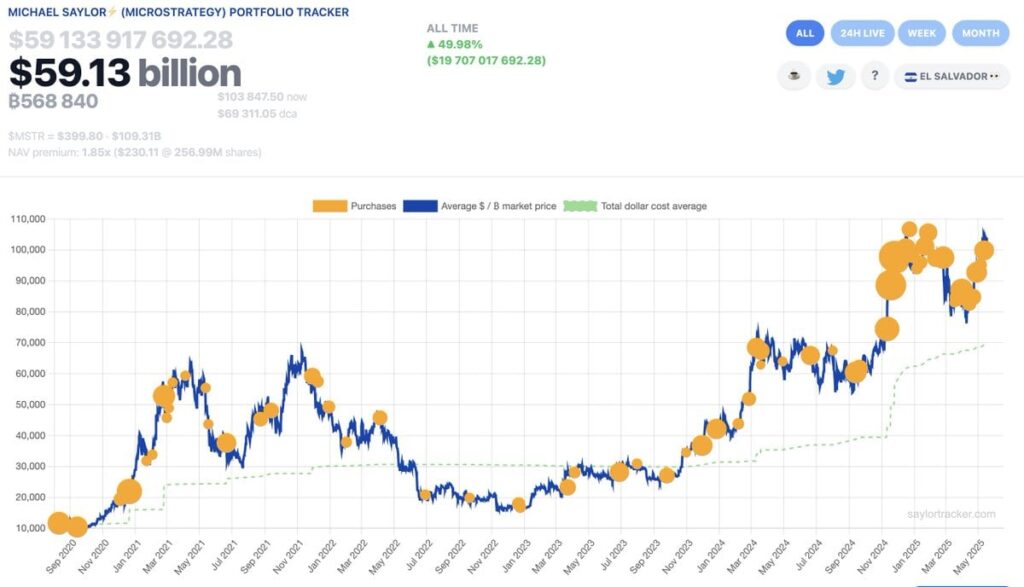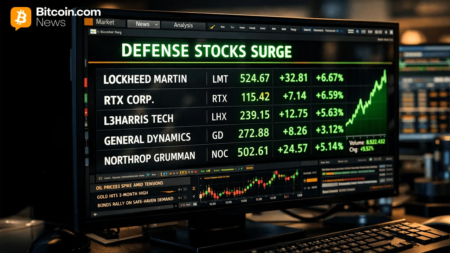Bitcoin Treasury Company Strategy: Driving Corporate Adoption of Bitcoin
Bitcoin treasury companies are rapidly transforming how corporations view and utilize cryptocurrencies as part of their financial strategies. MicroStrategy, now known as Strategy, is at the forefront of this movement, recently announcing the acquisition of an additional 7,390 Bitcoins (BTC) for approximately $764.9 million. This purchase marks a strategic decision to bolster their extensive cryptocurrency portfolio. With a total of 576,230 BTC currently held—valued at over $59 billion—Strategy’s investments reflect a calculated approach to capturing the value of Bitcoin as an asset class. Each BTC was acquired at an average price of $69,726, and despite recent market fluctuations, the company’s approach shows a confident outlook on Bitcoin’s future.
The latest Bitcoin acquisition was funded through funds raised from the sale of Strategy’s Class A common stock, which yielded approximately $705.7 million from 1,712,708 shares, alongside $59.7 million from the sale of STRK perpetual preferred stock. Currently, they have a staggering $18.98 billion in MSTR shares available for issuance, as part of their ambitious "42/42" capital raise plan aimed at raising $84 billion by 2027. This initiative demonstrates not only a commitment to Bitcoin as a long-term investment but also highlights Strategy’s intent to position itself as a leading corporate player in the Bitcoin treasury space.
Growing Ecosystem of Corporate Bitcoin Adoptions
The trend of corporate Bitcoin treasury holdings is gathering momentum, with over 70 companies now participating in this growing ecosystem. Firms like Cantor Fitzgerald, SoftBank, and Bitfinex are stepping into the fray, as they establish their own Bitcoin treasury strategies. Notably, a recent collaboration involving a $3.6 billion venture adds legitimacy and weight to this trend. The value of collectively accumulating Bitcoin not only serves as a hedge against inflation but also signifies a cultural shift toward mainstream acceptance of cryptocurrencies as viable treasury assets.
Recent movements indicate that corporate treasuries are becoming more aggressive in their Bitcoin accumulation strategies. Japanese investment firm Metaplanet even disclosed a noteworthy purchase of 1,004 BTC for approximately $104.3 million, emphasizing the growing interest in cryptocurrency holdings. Additionally, startups funded by Bitcoin-native firms are emerging, such as Nakamoto, which is tapping into the healthcare sector with a new public bitcoin treasury strategy. This diversification not only expands the Bitcoin adoption narrative but also intertwines cryptocurrency with essential sectors of the economy.
Market Dynamics and Analysis
As Strategy capitalizes on its Bitcoin accumulation, market analysts are weighing the potential impacts of such aggressive buying on Bitcoin’s market dynamics. While substantial acquisitions have historically placed upward pressure on Bitcoin prices, experts caution that continued aggressive buying could slow, leading to a gradual waning of momentum. Currently, Bitcoin is trading at around $103,188, reflecting a minor decrease of 1.3% over the past week. Analysts like Valentin Fournier from BRN highlight the importance of factoring in these trends as both bullish and bearish indicators shape the cryptocurrency’s trajectory.
The landscape is shifting not only because of aggressive acquisitions from existing entities but also due to the influx of new entrants into the Bitcoin treasury space. The recent announcements of various treasury strategies by companies ranging from GD Culture Group to Basel Medical Group indicate that many firms are exploring Bitcoin as a viable asset. Analysts at Bernstein estimate that corporate entities like Strategy could contribute an additional $330 billion to Bitcoin treasuries over the next five years, driven by a potentially more favorable regulatory environment in the U.S.
Financial Performance and Market Outlook
Strategy’s ongoing operations reflect a dual narrative of massive acquisition and fluctuating financial performance. The company recently reported a net loss of $4.2 billion for Q1, primarily due to unrealized losses on its Bitcoin holdings and the impact of new fair value accounting rules. Despite the volatility, analysts argue that with low debt levels and no immediate obligations before 2028, Strategy is in a favorable position to weather market fluctuations while continuing its Bitcoin acquisition strategy.
Investors are closely examining the premium at which Strategy trades relative to its Bitcoin net asset value. Despite reservations regarding its valuation, Strategy’s growing market cap continues to outpace many of its peers, reinforcing its status as a pioneer in the Bitcoin treasury model. Trading at approximately $399.80, the company’s stock demonstrates resilience even amid market corrections, suggesting confidence in its long-term strategy.
Caution Amidst a Thriving Landscape
While Strategy is leading the charge in corporate Bitcoin treasuries, the dialogue around fiscal responsibility in these investments is becoming increasingly pertinent. Former Wall Street trader Josh Mandell expressed concerns over the implications of treating such significant amounts of capital as easily accessible forms of currency, warning against the risks of over-reliance on speculative assets. The critiques emphasize the importance of responsible risk management in the ever-evolving world of cryptocurrency.
As more firms establish Bitcoin treasury strategies, the potential for volatility and regulatory scrutiny increases. Companies need to be vigilant about their fiscal health while remaining nimble in adapting to market changes. The adoption of Bitcoin as a treasury asset may fundamentally change how corporate balance sheets are viewed, paving the way for broader acceptance of digital assets across various industries.
Conclusion: The Future of Corporate Bitcoin Holdings
As Bitcoin continues to solidify its position in corporate treasuries, Strategy exemplifies how firms can strategically position themselves in the rapidly evolving digital asset landscape. With more companies recognizing the value and utility of Bitcoin, the overall market sentiment leans toward optimism despite potential headwinds. The strategic initiatives, from capital raises to acquisitions, pave the way for a future where Bitcoin could become a staple in corporate finance.
The growing ecosystem fueled by both traditional companies and innovative startups hints at a disruptive transformation in investment paradigms. The next chapter in corporate Bitcoin treasury strategies will not only be defined by the acquisitions themselves but also by how these holdings influence market dynamics and broader economic conditions in the years to come. The horizon is bright for Bitcoin, especially as corporate interest continues to swell, reinforcing its potential as a cornerstone asset in the modern financial landscape.
















